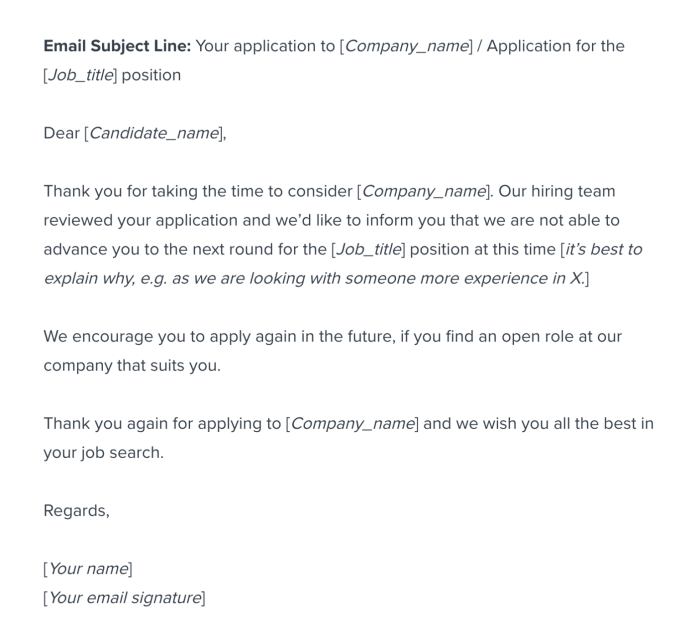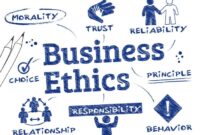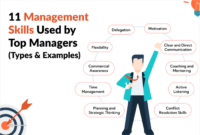Why the job you apply for may not be the job you get? It’s a question that crosses many job seekers’ minds. The job application process, from submitting your resume to accepting an offer, is a complex journey with multiple decision points.
While you might be a perfect fit for the job description, several factors beyond your control can influence the outcome.
From the company’s changing needs to the strength of the candidate pool, the hiring process is a dynamic dance of qualifications, priorities, and unforeseen circumstances. It’s not always about being the most qualified; it’s about aligning with the company’s vision and demonstrating a strong cultural fit.
The Application Process

Navigating the job application process can be a complex journey, often involving multiple stages and decision points. Understanding the process and how companies evaluate candidates is crucial for increasing your chances of success.
Stages of the Application Process
The job application process typically involves several distinct stages, each with its own set of evaluation criteria.
- Initial Application:The first step involves submitting your resume and cover letter, showcasing your relevant skills and experience. This stage is often automated, with applicant tracking systems (ATS) scanning resumes for s and matching them against job requirements.
- Screening:Once you pass the initial screening, you may be contacted for a phone or video interview. This stage allows recruiters to assess your basic qualifications, communication skills, and suitability for the role.
- Interviews:The interview stage can involve multiple rounds, with each interview focusing on different aspects of your qualifications and experience. These interviews may be conducted by hiring managers, team members, or human resources representatives.
- Assessment Tests:Some companies use assessment tests to evaluate your skills and abilities in areas such as problem-solving, critical thinking, or personality traits. These tests provide objective data to supplement the information gathered during interviews.
- Background Checks:Before extending an offer, companies may conduct background checks to verify your employment history, education, and criminal record.
- Offer Negotiation:If you are selected, you will receive a job offer outlining the terms and conditions of employment. You may have the opportunity to negotiate salary, benefits, and other aspects of the offer.
Assessment of Qualifications and Experience
Throughout the application process, companies use various methods to assess your qualifications and experience.
- Resume and Cover Letter:These documents are the first impression you make, providing a summary of your skills, experience, and career goals. Companies use s and specific phrases to identify candidates who meet the minimum requirements.
- Interview Questions:Interviews are designed to delve deeper into your skills, experience, and personality. Companies ask behavioral questions to understand how you have handled past situations, and technical questions to assess your knowledge and abilities.
- Assessment Tests:These tests provide objective measures of your skills and abilities, helping companies identify candidates with the necessary aptitude and potential for success in the role.
- References:References from previous employers or mentors can provide valuable insights into your work ethic, performance, and interpersonal skills.
Use of Screening Tools and Automated Systems
Many companies rely on screening tools and automated systems to streamline the application process and identify qualified candidates.
- Applicant Tracking Systems (ATS):These systems scan resumes and cover letters for s and match them against job requirements. Candidates who meet the minimum criteria are then forwarded to the next stage of the process.
- Pre-employment Assessments:These assessments are used to evaluate candidates’ cognitive abilities, personality traits, and skills. Companies use the results to identify candidates who are a good fit for the role and the company culture.
- Social Media Screening:Some companies use social media platforms to gather information about candidates, such as their interests, professional connections, and online presence. This information can be used to assess a candidate’s suitability for the role and the company culture.
Company Needs and Priorities: Why The Job You Apply For May Not Be The Job You Get
It’s important to remember that hiring decisions aren’t made in a vacuum. Companies have specific goals, objectives, and current business needs that heavily influence who they choose to bring on board. Understanding these factors can give you a better perspective on why you might not get the job, even if you’re a strong candidate.
Company Goals and Objectives
Companies have a clear vision of where they want to go and what they want to achieve. This vision translates into specific goals and objectives that guide their operations, including hiring decisions. A company might be looking to expand into a new market, develop a new product line, or improve customer service.
The candidate they select will need to possess the skills and experience necessary to contribute to these goals.
Company Budget and Resources
Every company operates within a budget, and this budget can influence the hiring process. Some companies may be willing to invest heavily in attracting top talent, while others may have tighter constraints. Budgetary limitations can affect salary offers, benefits packages, and even the number of positions that are available.
Team Dynamics and Organizational Structure
A company’s team dynamics and organizational structure play a significant role in the hiring process. Companies look for candidates who will fit seamlessly into their existing teams and contribute positively to the overall organizational culture. They may consider factors such as communication style, work ethic, and personality when making hiring decisions.
Unforeseen Circumstances and Changes in Needs, Why the job you apply for may not be the job you get
Sometimes, unforeseen circumstances or changes in a company’s needs can alter the hiring process. For example, a company might experience a sudden downturn in the economy, leading to a hiring freeze or a reduction in the number of positions available.
Alternatively, a company might discover that its initial needs have changed, requiring a different skill set from the ideal candidate.
The Candidate Pool
Imagine a large pool filled with potential employees, each with their own unique skills, experience, and aspirations. This is the candidate pool – the group of individuals who have applied for a particular job opening. The size and quality of this pool play a crucial role in the hiring process, influencing the company’s ability to find the ideal candidate.The size of the candidate pool can significantly impact the hiring process.
A larger pool generally provides more options, increasing the chances of finding a highly qualified candidate. However, a large pool can also make the screening process more challenging and time-consuming. Conversely, a smaller pool may limit the company’s choices, potentially forcing them to settle for a less-than-ideal candidate.
The Impact of Competitive Candidates
The presence of competitive candidates can significantly influence the hiring decision. These individuals possess exceptional qualifications and experience, often exceeding the minimum requirements for the position. Their strong applications and impressive skills make them stand out from the crowd, forcing the company to raise the bar for evaluation.
This competition pushes other candidates to demonstrate their unique strengths and differentiate themselves to secure an interview.
Prioritization Based on Skills, Experience, and Cultural Fit
Companies often prioritize candidates based on specific skills, experience, and cultural fit. This prioritization helps narrow down the pool and focus on individuals who align best with the company’s needs and values.
Skills and Experience
Companies may prioritize candidates who possess specific technical skills, industry knowledge, or relevant work experience. For example, a software development company may prioritize candidates with expertise in specific programming languages or experience in agile development methodologies. This prioritization ensures that the selected candidate can contribute effectively from day one.
Cultural Fit
Companies also consider cultural fit when evaluating candidates. Cultural fit refers to the alignment between a candidate’s values, beliefs, and work style with the company’s culture. This is crucial for ensuring a positive and productive work environment. Companies may use interviews, personality assessments, or other methods to gauge cultural fit.
“Cultural fit is important, but it should not be used as a way to exclude diverse candidates.”
Companies should be mindful of unconscious bias and ensure that their prioritization process is fair and inclusive.
The Interview Process
The interview process is a crucial stage in the hiring process, where employers assess candidates’ suitability for the role. It’s a chance for you to showcase your skills and personality, and for the employer to learn more about you beyond your resume.
Types of Interviews
The interview process can take various forms, each with its own purpose and structure. The most common types of interviews include:
- Phone Interviews:These are often the first step in the interview process, used to screen candidates and assess their basic qualifications. They are typically shorter than in-person interviews and focus on assessing your communication skills and understanding of the role.
- Video Interviews:Video interviews have become increasingly popular in recent years, particularly for remote roles. They allow employers to assess your communication skills, personality, and ability to present yourself professionally in a virtual setting. Popular platforms for video interviews include Zoom, Microsoft Teams, and Google Meet.
- In-Person Interviews:These interviews are typically conducted at the employer’s office and allow for a more in-depth assessment of your skills, experience, and personality. They provide an opportunity for you to learn more about the company culture and ask questions about the role and team.
Interview Questions
Interview questions are designed to assess a candidate’s skills, knowledge, and suitability for the role. They can be divided into several categories:
- Behavioral Questions:These questions focus on your past experiences and how you have handled specific situations. They aim to assess your problem-solving abilities, decision-making skills, and ability to work under pressure. Examples include: “Tell me about a time you had to deal with a difficult customer” or “Describe a situation where you failed and what you learned from it.”
- Situational Questions:These questions present you with hypothetical scenarios and ask how you would respond. They assess your critical thinking skills, judgment, and ability to adapt to different situations. Examples include: “How would you handle a situation where a colleague is not meeting deadlines?” or “What would you do if you were faced with a major ethical dilemma?”
- Technical Questions:These questions focus on your knowledge and skills related to the specific role. They may involve technical concepts, software programs, or industry-specific knowledge. Examples include: “Explain the difference between SQL and NoSQL databases” or “Describe your experience with Agile methodologies.”
- Culture Fit Questions:These questions aim to assess your personality, values, and whether you would be a good fit for the company culture. Examples include: “What are your strengths and weaknesses?” or “Why are you interested in working for this company?”
Evaluating Candidates
Interviewers use various methods to evaluate candidates, including:
- Communication Skills:Interviewers pay attention to your clarity, articulation, and ability to express yourself effectively. They also assess your listening skills and ability to respond appropriately to questions.
- Problem-Solving Abilities:Interviewers evaluate your ability to analyze problems, develop solutions, and think critically. They may ask you to explain how you have solved problems in the past or to present your approach to a hypothetical scenario.
- Cultural Fit:Interviewers assess your personality, values, and whether you would be a good fit for the company culture. They may ask you about your work style, your preferred team environment, and your career aspirations.
Beyond the Interview

The interview process might seem like the final hurdle, but it’s just the beginning of the final stage. The hiring process doesn’t end with the interview. Companies often conduct further checks to ensure they are making the best decision.
Discover more by delving into tomtom attempting wrestle control of digital map back from silicon valley further.
Reference Checks and Background Verification
Reference checks and background verification are crucial steps in the hiring process. These checks provide a more comprehensive view of a candidate’s professional history and character. Companies use these checks to verify the information provided on a candidate’s resume and during interviews.
They also help assess the candidate’s work ethic, skills, and overall suitability for the role.
- Reference Checks:Companies contact previous employers or professional contacts listed by the candidate to gather insights about their work performance, skills, and personality. They may ask about the candidate’s strengths, weaknesses, achievements, and overall contribution to the team.
- Background Verification:Companies may conduct background checks to verify a candidate’s educational qualifications, criminal history, credit history, and other relevant information. These checks help ensure the candidate is trustworthy and meets the company’s standards.
Additional Assessments and Tests
Beyond reference checks, companies may use additional assessments or tests to evaluate candidates’ skills and suitability for the role. These assessments can be specific to the job requirements and can include:
- Skills Tests:These tests assess specific technical skills or software proficiency needed for the role. For example, a software developer might be asked to complete a coding challenge to demonstrate their programming skills.
- Personality Tests:These tests measure personality traits and work styles to see if the candidate is a good fit for the company culture and the specific team dynamics.
- Situational Judgement Tests:These tests present candidates with real-life work scenarios and ask them to choose the best course of action. This helps assess their problem-solving abilities, decision-making skills, and ethical judgment.
Final Decision and Notification
Once all the assessments and checks are completed, the hiring manager and HR team will make a final decision. This decision considers the candidate’s performance in the interview, the results of reference checks and background verification, and the scores on any additional assessments.
- Notification:The chosen candidate is typically notified by phone or email. The notification will include details about the job offer, including the salary, benefits, and start date.
- Unselected Candidates:Candidates who are not selected for the position are also typically notified. This notification may be sent by email or phone and usually expresses appreciation for their interest and time.
Unforeseen Circumstances

The hiring process, despite its structured nature, is not immune to the unexpected. Unforeseen circumstances can arise, altering the company’s priorities, timelines, and even the final decision. These changes can significantly impact the candidate’s journey.
Impact on the Hiring Process
Unforeseen circumstances can significantly impact the hiring process, leading to delays, adjustments in priorities, or even the cancellation of the position. For example, a sudden economic downturn could force a company to freeze hiring or reduce its budget for new positions.
Similarly, a change in leadership or a merger could lead to a reassessment of hiring needs.
- A company may experience a sudden surge in demand for a particular product or service, leading to a need for additional staff. This could result in a faster hiring process, with the company prioritizing speed over a comprehensive search.
- Conversely, a drop in demand could lead to a slowdown in hiring or even a hiring freeze, as companies adjust to reduced revenue and operational needs.
Candidate’s Availability, Relocation, and Salary Expectations
Unexpected changes can also affect the candidate’s circumstances, influencing their availability, relocation requirements, or salary expectations. For example, a candidate may receive a job offer from another company, leading them to withdraw their application or negotiate a higher salary.
- A candidate’s relocation requirements may become more challenging if the company’s location faces unforeseen events, such as natural disasters or political instability.
- A candidate’s salary expectations may need to be adjusted if the company’s financial situation changes or if the job’s responsibilities are redefined due to unforeseen circumstances.
The Importance of Fit
You’ve aced the interview, your resume is stellar, and your skills align perfectly with the job description. Yet, you might not get the offer. It’s not always about qualifications – it’s about “fit.” “Cultural fit” is a crucial factor in hiring decisions, often weighing as heavily as skills and experience.
It’s about how well you align with the company’s values, work style, and overall atmosphere.
Assessing Cultural Fit
Companies want to ensure new hires will thrive in their environment. They use the interview process to gauge your personality, values, and work style. Here’s how:
- Behavioral Questions:These questions delve into your past experiences, asking how you handled specific situations. They provide insights into your problem-solving skills, decision-making, and approach to challenges.
- Situational Questions:These questions present hypothetical scenarios, asking how you’d react in certain situations. They reveal your adaptability, communication style, and ability to work under pressure.
- Culture-Specific Questions:Companies may ask questions directly related to their values and work environment. For example, “How do you handle conflict?” or “Describe your ideal work environment.” These questions assess your compatibility with their culture.
Prioritizing Cultural Fit
Companies often prioritize candidates who align with their organizational culture. Here are some examples:
- Startups:Often prioritize candidates who are adaptable, resourceful, and comfortable with ambiguity. They seek individuals who can thrive in fast-paced environments and contribute to a collaborative culture.
- Large Corporations:May emphasize candidates who are detail-oriented, process-driven, and comfortable with established hierarchies. They seek individuals who can work effectively within structured environments.
- Non-Profits:Often prioritize candidates who are passionate about their mission, collaborative, and driven by a desire to make a positive impact. They seek individuals who are aligned with their values and contribute to a shared purpose.





